Scottish football 'needs tougher sanctions for sectarianism'
- Published
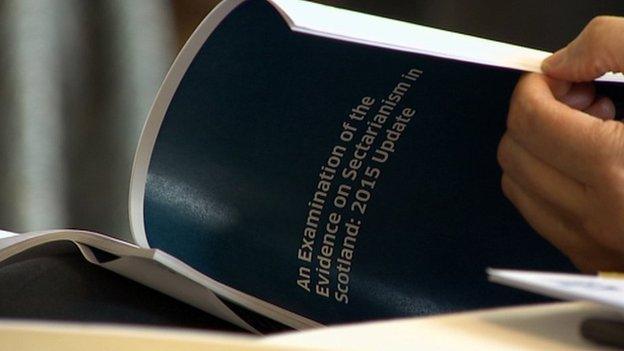
The report follows an extensive study by the Advisory Group on Tackling Sectarianism
The Scottish football authorities should come up with tougher ways of dealing with sectarianism, according to a government-commissioned study.
The recommendation was one of a series made by the Advisory Group on Tackling Sectarianism.
Scottish clubs do not currently operate a policy of "strict liability", which would see them held responsible for the behaviour of their fans.
The report challenged clubs to come up with an alternative.
The report follows an extensive study by the Advisory Group on Tackling Sectarianism
And it said sanctions were "urgently needed".
The final report follows a two year study by the advisory group, which saw it gather evidence, research and opinions from across wide sections of Scottish society.
The advisory group has now made a number of recommendations for churches, schools, football clubs, media and government bodies.
But it highlighted football in particular as an area where action to tackle the issue was urgently required.
Fans misbehaviour
The report said: "It is clear that a strategic and measured response to Scotland's remnants of sectarian attitudes and behaviour cannot succeed without squarely addressing the sectarian problems within and around football."
The group said it was "struck by the reticence about leadership in addressing sectarianism from within Scottish football".
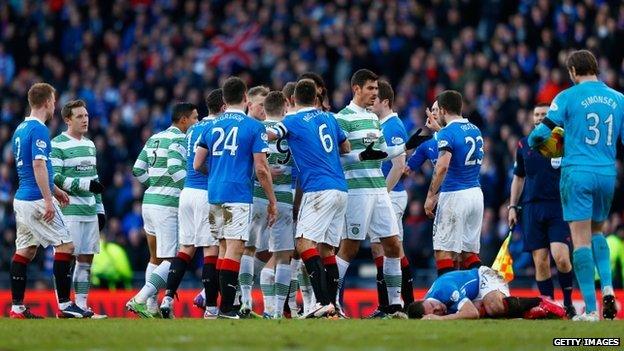
Fans of both Rangers and Celtic have been accused of sectarianism in the past
It said that during meetings with both the football authorities and Celtic and Rangers Football Clubs, it was suggested the system of "strict liability" for fans misbehaviour - which has been in place for a number of years in UEFA competitions - would "be difficult, if not impossible, to introduce in Scotland".
However, the group said: "We feel very strongly that sanctions are urgently needed and remain of the view that their introduction would not simply be a step towards tackling sectarianism, but also an important step towards clubs and their fans taking responsibility for their actions as we all have to do elsewhere in society."
One of the reasons given by clubs and the football authorities for not adopting "strict liability" was the financial impact it could have.
The report said: "We were told that one reason that strict liability was unworkable in Scotland was because certain stadia would be closed for months leading to severe financial hardship for particular clubs.
"However, that claim also makes the case for action. If elements within Scottish football make it so toxic that it cannot survive the introduction of strict liability, then we need to find ways to address these elements."
The report said the issue of marches and parades "remains contentious."
It said: "The ultimate responsibility for such events, the behaviour associated with them and those who turn up to spectate lies with those organising the event."
The group said more should be done by march organisers to reassure the general public about the nature of the parades, and issues of public safety and public order.
It also said those who organise the events should take more responsibility for the behaviour of so-called "hangers-on".
The report also urged the media to play a role in tackling sectarianism by not "sensationalising" or "stoking the flames of sectarianism" through headlines.
It cited the example of the Celtic v Rangers league cup semi-final in February.
'Stamp out'
Chairman of the advisory group, Dr Duncan Morrow said: "Our work over the last two years has explored how sectarianism continues to manifest itself in Scotland today and how it still has the power to impact negatively on people's lives.
"But we have also seen a strong hunger for change across Scotland and a real desire to make sectarianism a thing of the past.
"I believe that this desire amounts to a real commitment from Scotland's communities and a challenge for leaders and institutions to set out a clear and inclusive vision that rejects avoidance and blame."
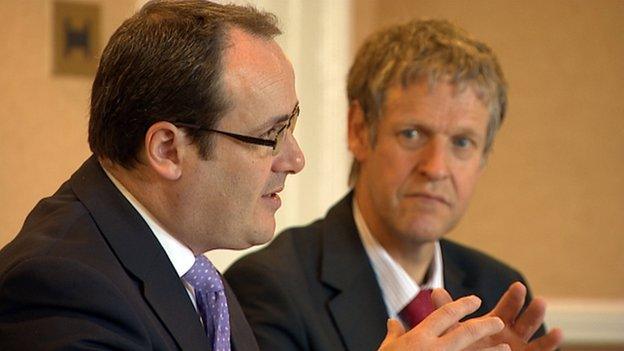
The group's report was presented to Minister for Community Safety and Legal Affairs Paul Wheelhouse
The Scottish government welcomed the recommendations made by the advisory group.
Community Safety and Legal Affairs Minister Paul Wheelhouse, said: "This Scottish government will continue to do all it can to create a Scotland free from the scourge of sectarianism through a range of approaches.
"As a result of the work undertaken by the independent advisory group and our many community based projects we now understand the nature and extent of sectarianism better than ever before."
He added: "The report published today makes it clear that the approach we are taking is the right one.
"It also confirms that each and every person in Scotland has a part to play in tackling sectarianism and I would urge everyone in Scotland to consider how they can help stamp out this issue."
'Simple choice'
Anti-sectarianism charity Nil By Mouth, which has repeatedly called for Scottish football to introduce the "strict liability" policy, welcomed the group's recommendations.
Campaign director Dave Scott said: "Football in particular has to face up to the reality of its responsibilities.
"We are pleased that the advisory group has recognised the importance of 'strict liability' being introduced into the Scottish game."
He added: "The SFA AGM is to be held next month and we still have time to introduce strict liability for next season if the clubs have the will and courage to act.
"The choice for the game is simple: remain part of the problem or be part of the solution."
- Published20 February 2015
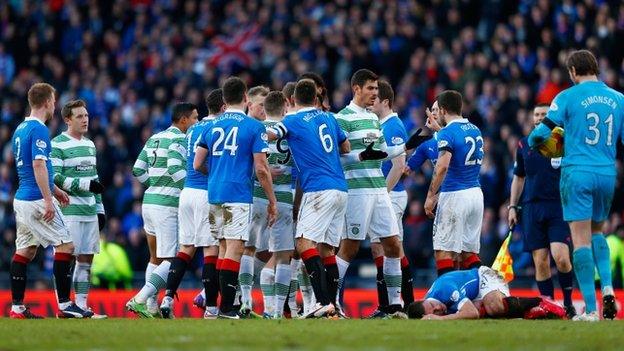
- Published20 March 2014

- Published3 February 2015

- Published1 March 2013

- Published13 December 2013
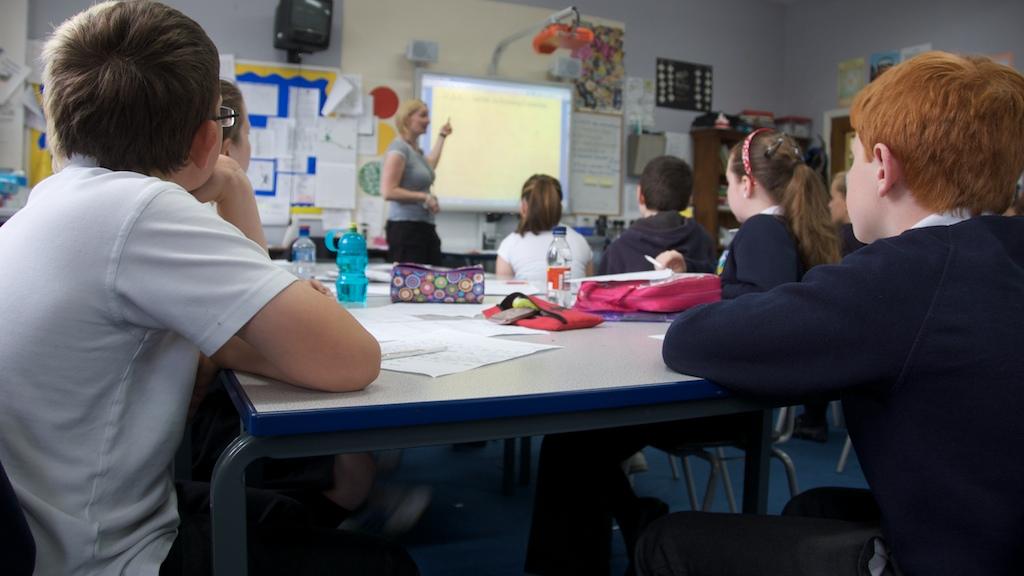
- Published2 March 2012

- Published5 November 2012
